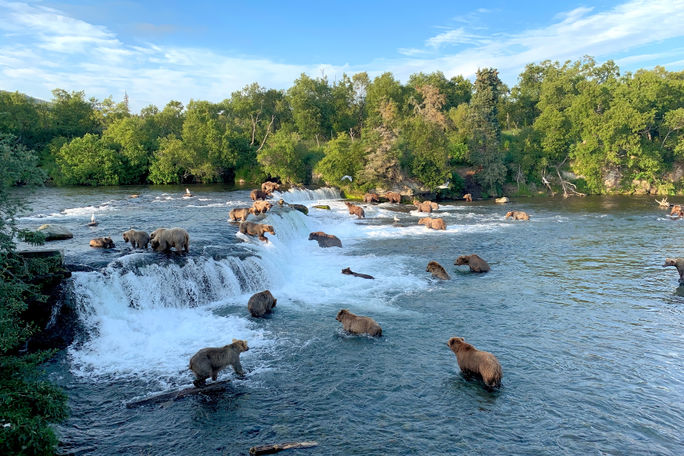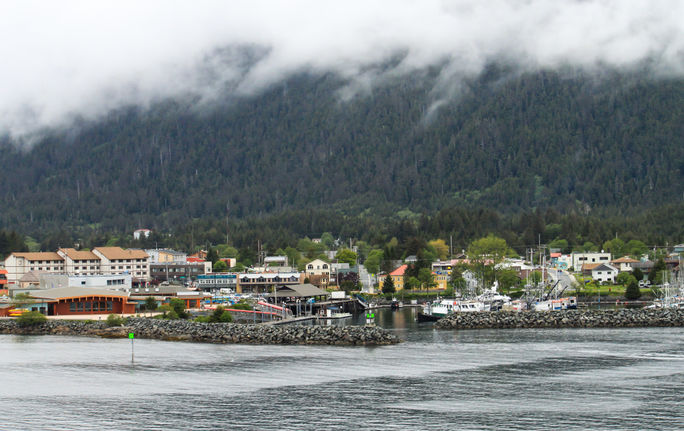Alaska cruising is on a roll: After a brief setback in
2020-2021 due to the COVID-19 pandemic and accompanying cruise shutdowns,
passenger numbers have recovered to their pre-pandemic levels and even exceeded
them.
In 2024, some 1.67 million passengers came ashore in Juneau,
Alaska’s capital and most popular port city, setting an all-time record.
Similar numbers are predicted for 2025. Moreover, 65 percent of Alaska's summertime
visitors arrive by cruise ship, compared to 35 percent who travel
independently, according to research from the Alaska Travel Industry Association
(ATIA). Taken together, it adds up to a growing opportunity for travel advisors
to make more bookings and earn greater commissions.
Advisors play a pivotal role in helping clients to navigate
among their many choices. “They’re a great time saver,” said Liz Perry,
President and CEO of Travel Juneau, “and when educated about the destination,
can provide insight and value to clients. The education piece is key, and many
DMOs like Travel Juneau are providing accurate, local knowledge to advisors.”
Reasons to sell Alaska Cruises
While Alaska cruises share many of the advantages of
cruising in general, there are several benefits specific to the destination. Here
are four reasons why Alaska is such a good bet for your cruise clients and how that
can translate into new and repeat business:
1. Unique advantages
As a cruise destination, Alaska offers some unique
advantages. Being part of the United States, Alaska has long been perceived as
a “safe harbor” far from any international turmoil. “Alaska is exotic but
domestic – allowing cruise visitors to see a place unlike any other in the
United States, without having to travel around the globe,” said Lanie Downs,
Senior Director of Community Relations and Public Affairs for Cruise Lines
International Association (CLIA) Alaska.
Cruising to Alaska has the added benefit of easy access.
Clients can drive directly to the ship rather than fly into Seattle or
Vancouver, lowering the cost and overcoming any resistance to flying. (Although
Alaska is a domestic cruise destination, passengers still need a passport, Downs
noted, as all Alaska cruises aboard a foreign-flag ship must stop at a foreign
port to comply with U.S. law.)

Brown Bears at Brooks Falls in Katmai National Park, Alaska. (Photo Credit: Mark Kostich/Adobe)
From the standpoint of repeat business, Alaska is remarkably
popular with passengers who have been there and generates sky-high satisfaction
ratings: A recent survey by the ATIA found that a whopping 77 percent of cruise
visitors say they plan to return to Alaska on a future trip. “Alaska isn’t just
a ‘one time’ visit destination,” Downs emphasized. “With all the different
offerings, experiences, ships and itineraries, it is becoming an increasingly
popular repeat destination.”
2. Longer itineraries
Although seven-day itineraries are still the mainstay of
Alaska cruising – often roundtrip from Seattle and Vancouver or one-way between
Vancouver and Seward or Whittier (the port cities for Anchorage) – Alaska
cruises are trending longer, with two-, three- and even four-week itineraries
increasingly available. Lengthier cruises such as these can mean larger
commissions.
In addition, over 20 percent of Alaska cruisers book a land
segment before or after their voyage. Featuring overland travel by train and
motorcoach, these cruise-tour itineraries have more limited capacity and
command higher prices, providing the potential for advisors to earn additional
commissions on top of a cruise-only booking.
Another avenue for increased bookings is transpacific
cruises, which depart every spring and fall as ships reposition between Alaska
and Asia or the South Pacific. With more ships entering the market, these
sailings have also become a growth opportunity for advisors.
3. Expanded choices
The growth of Alaska cruising continues to be fueled by
ever-larger ships and by new cruise lines entering the market or returning
after an absence. Princess Cruises, for example, recently announced that it will
send the 4,300-passenger Star Princess to Alaska in 2026, the newest ship in
the Princess fleet and its biggest ever to sail there in over 55 years of the
line cruising to Alaska.

Sitka, Alaska. (Photo Credit: Joni / Adobe Stock)
Next year, cruise lines new to Alaska will include MSC Cruises, The Ritz-Carlton Yacht Collection and Virgin Voyages. Lines planning to come back include Azamara
Cruises, Crystal Cruises and Windstar Cruises – the latter featuring the Star
Seeker, its first newly built vessel.
Small-ship operators in Alaska are expanding their
offerings, too: Companies such as UnCruise Adventures and Alaskan Dream Cruises
continue to introduce new itinerary choices. American Cruise Lines is doubling
capacity for 2025, and adventure operator Gondwana Ecotours will dip its toe
into Alaska cruising for the first time this year with a yacht tour of the
Inside Passage.
4. Improved infrastructure
To stay competitive, Alaska’s cruise stakeholders have
invested in their infrastructure. New cruise facilities have come online or are
in the planning stages throughout the state. New docks and private cruise
destinations have made their debut in Ketchikan, Sitka, Klawock and Whittier, while
other projects are currently under development in Seward and Juneau. Several
are Native-owned, contributing to Alaska’s appeal as an authentic travel
destination.
To learn more about Alaska cruising, log on to the CLIA Alaska
website for news,
port schedules and a listing of the organization’s 21 member cruise lines.
For the latest travel news, updates and deals, subscribe to the daily TravelPulse newsletter.
Topics From This Article to Explore